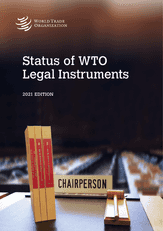Marrakesh Agreement Establishing the World Trade Organization (WTO)
The World Trade Organization (WTO) was formally established by the Final Act of the Uruguay Round of Multilateral Trade Negotiations, or Marrakesh Agreement on 1 January 1995.
The General Agreement on Tariffs and Trade (GATT), the General Agreement on Trade in Services (GATS), and the Agreement on Trade-Related Aspects of Intellectual Property Rights (TRIPS) are annexes to this umbrella Agreement; all WTO member states are automatically bound to these treaties and do not undergo a separate signature and ratification process for them. The WTO is responsible for settling disputes that arise between member states under these trade agreements, and works with developing countries to support the development of technical trade laws and capacities.
This document includes: Final Act Embodying the Results of the Uruguay Round of Multilateral Trade Negotiations; Declaration on the Contribution of the WTO to Achieving Greater Coherence in Global Economic Policymaking; Decision on Trade and Environment; Decision on the Acceptance of and Accession to the Agreement Establishing the WTO.
| Opened for signature | 15 Apr 1994 | ||||
| Entered into force | 1 Jan 1995 | ||||
| Latest update | 15 Apr 2021 | ||||
| Available languages |
|
Related treaties
Related topic
States parties
The parties to the General Agreement on Tariffs and Trade (GATT) became the original WTO member states after ratifying the Marrakesh Agreement, which entered into force on 1 January 1995. All other members have joined the organization as a result of negotiation, and the terms of accession are dependent upon the country's stage of economic development and the current trade regime. An offer of accession is given once consensus is reached among members.
The WTO has 164 members and 25 observer governments.
Country | Status | Signed | Ratified | Entered into force |
|---|---|---|---|---|
| Afghanistan | Party | 17 Dec 2015 | 29 Jun 2016 | 29 Jul 2016 |
| Albania | Party | 17 Jul 2000 | 9 Aug 2000 | 8 Sep 2000 |
| Algeria | Observer | 15 Apr 1994 | ||
| Andorra | Observer | |||
| Angola | Party | 15 Apr 1994 | 24 Oct 1996 | 23 Nov 1996 |
| Antigua and Barbuda | Party | 15 Apr 1994 | 1 Jan 1995 | |
| Argentina | Party | 15 Apr 1994 | 29 Dec 1994 | 1 Jan 1995 |
| Armenia | Party | 10 Dec 2002 | 6 Jan 2003 | 5 Feb 2003 |
| Australia | Party | 21 Dec 1994 | 1 Jan 1995 | |
| Austria | Party | 15 Apr 1994 | 6 Dec 1994 | 1 Jan 1995 |
Party
The state has accepted, approved, ratified, or is otherwise party to the agreement, indicating consent to be bound to the agreement.
Signatory
The state has signed, but not yet ratified or become an official party to the agreement. Where the signature is subject to ratification, acceptance or approval, the signature does not establish the consent to be bound. However, it is a means of authentication and expresses the willingness of the signatory state to continue the treaty-making process. The signature qualifies the signatory state to proceed to ratification, acceptance or approval. It also creates an obligation to refrain, in good faith, from acts that would defeat the object and the purpose of the agreement.
Non-party
The state has not taken any actions with regard to the agreement.
Associate member
The state may have requirements for some of the statutory or non statutory aspects of an agreement, but would not confer all of the obligations of the agreement on the member. Associate members may not have voting rights.
Observer
The state is non-party to an agreement, but has the ability to attend meetings or other discussions, and otherwise participate in activities. Observers may be granted permission to speak at formal meetings.




